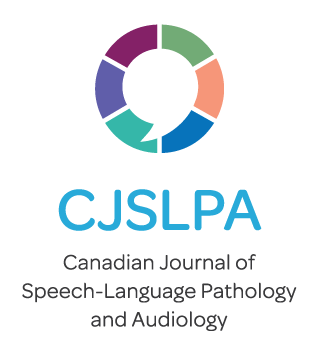

| Author(s) |
Elizabeth Fitzpatrick David Schramm |
| Volume | 30 |
| Number | 3 |
| Year | 2006 |
| Page(s) | 192-197 |
| Language | English |
| Category | |
| Keywords |
prelingual deafness cochlear implants outcome clinician’s perspective qualitative research |
| Abstract |
The purpose of this exploratory research was to better understand the cochlear implant experience of adults with prelingual deafness from the perspective of service providers. Through a focus group format, clinicians shared their perceptions of the factors that influence candidacy decisions and outcomes in this challenging patient population. All data were coded inductively and analyzed drawing from a grounded theory method. The findings indicate that the benefits of cochlear implantation for adults with prelingual deafness who undergo late implantation are influenced by individual and external factors and are characterized by great variability. The central phenomenon emerging in this study was that cochlear implantation facilitates communication for adults with prelingual deafness, both in the domains of traditional hearing related communication abilities and social functioning. Areas for further study were identified in order to better understand and assess the benefits of cochlear implantation for people with prelingual deafness. Cette étude exploratoire a pour but d’examiner du point de vue du fournisseur de services l’expérience que vivent les adultes qui ont une surdité prélinguistique et qui ont reçu un implant cochléaire. Par le biais d’un groupe de discussion, les cliniciens ont partagé leur perception des facteurs influençant la sélection des candidats et les résultats attendus pour cette population présentant des défis particuliers. Toutes les données ont été codées et analysées selon la méthode de la théorie ancrée. Les résultats indiquent que les avantages de l’installation tardive d’un implant cochléaire chez des adultes ayant une surdité prélinguistique sont tributaires de facteurs individuels et externes, lesquels entraînent une variation importante. Cette étude fait principalement ressortir que l’implant cochléaire facilite la communication chez les adultes ayant une surdité prélinguistique, tant au niveau des habiletés auditives de communication évaluées traditionnellement que du fonctionnement en société. Elle précise aussi des domaines où il faut poursuivre la recherche pour mieux comprendre et évaluer les avantages de l’implantation cochléaire chez les personnes ayant une surdité prélinguistique. |
| Record ID | 932 |
| Link | https://cjslpa.ca/files/2006_JSLPA_Vol_30/No_03_153-208/Fitzpatrick_Schramm_JSLPA_2006.pdf |
CJSLPA is an open access journal which means that all articles are available on the Internet to all users immediately upon publication. Users are allowed to read, download, copy, distribute, print, search, or link to the full texts of the articles, or use them for any other lawful purpose.
CJSLPA does not charge authors publication or processing fees.
Copyright of the Canadian Journal of Speech-Language Pathology and Audiology is held by Speech-Language and Audiology Canada (SAC). Appropriate credit must be given (SAC, publication name, article title, volume number, issue number and page number[s]) but not in any way that suggests SAC endorses you or your use of the work. You may not use this work for commercial purposes. You may not alter, transform, or build upon this work.